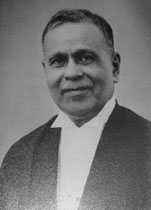
Meet Justice Sir Saiyid Fazl Ali and his Notable Judicial decisions
Justice Sir Saiyid Fazl Ali (1886–1959) was a pioneering jurist who played a foundational role in India’s higher judiciary during a period of immense constitutional transformation. He was one of the first eight judges appointed to the Supreme Court of India after serving on the Federal Court, the highest court in colonial India. Over his Supreme Court tenure (1947–1952), Justice Fazl Ali authored 56 judgments and sat on 113 benches, with a significant focus on criminal, constitutional, family, property, and taxation law.
Judicial Career and Philosophy
Justice Fazl Ali was known for his independent thinking and liberal approach, often dissenting from the majority in cases involving fundamental rights and state power. He was educated as a barrister in London and brought a cosmopolitan legal perspective to the bench. His judgments frequently reflected a concern for individual liberty and the broader public good.
Landmark Judgments
1. A.K. Gopalan v. State of Madras (1950)
This was the first major writ of habeas corpus before the Supreme Court. The case challenged the constitutionality of preventive detention under the Madras Act, arguing it violated the right to personal liberty (Article 21) and freedom of movement (Article 19(1)(d)). While the majority upheld the law, Justice Fazl Ali’s famous dissent argued that Article 19 and Article 21 were interconnected, and that preventive detention restricted both personal liberty and freedom of movement. His view, though initially in the minority, later influenced the Supreme Court’s broader interpretation of fundamental rights.
2. Romesh Thapar v. State of Madras (1950)
This case struck down a law banning the circulation of a journal, holding that “security of the state” could not be broadly interpreted to include “public order” as a reasonable restriction on free speech. Justice Fazl Ali dissented, arguing that peace and tranquillity were integral to state security, and thus restrictions for public order were justified. His nuanced understanding of the balance between order and liberty remains influential.
3. Brij Bhushan v. State of Delhi (1950)
The Supreme Court struck down pre-censorship provisions on publications as unconstitutional. Justice Fazl Ali again dissented, reiterating his view from Romesh Thapar that restrictions for public disorder were valid if they protected state security.
Other Contributions
Justice Fazl Ali was appointed to the Calcutta Disturbances Inquiry Commission to investigate communal violence during Partition.
He chaired the States Reorganisation Commission, which recommended linguistic reorganization of Indian states, shaping the federal structure of modern India.
He served as Governor of Odisha and Assam, and was awarded the Padma Vibhushan for his public service.
Legacy
Justice Sir Saiyid Fazl Ali is remembered for his principled dissents on civil liberties, his role in shaping constitutional interpretation, and his contributions to India’s administrative and legal architecture. His judgments on preventive detention and free speech laid the groundwork for later expansions of fundamental rights, and his work on state reorganization had a lasting impact on Indian federalism.












comments